We acknowledge that the final authority regarding these messages
rests
with the Holy See of Rome.
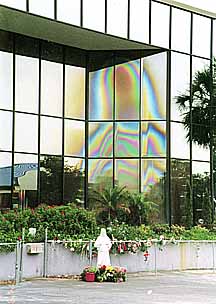
| Mary has requested that the daily message be given each day to the
world. It is read nightly at the prayer service from her Image Building in Clearwater,
Florida, U.S.A. This is according to her request. All attempts will be made to publish
this daily message to the world at 11 p.m. Eastern time, U.S.A. We acknowledge that the final authority regarding these messages
rests |
 |
August 9, 2003
August 10th Holy Spirit Novena
Scripture selection is Day 8 Period I.The Novena Rosary Mysteries for August 10th are the Glorious.
We are going to play the 5th again
tomorrow night - a sing along.
The Blue Book Reading
will be on Sunday at 4:35 p.m.
Tune in to the web radio.
We need money for
the building payment.
Schedule for August 10, 2003
4:00 a.m. - Mass4:37 a.m. - Morning Offering
4:41 a.m. - Tell My People read by Father Carter
6:12 a.m. - Morning Offering & Prayer for Union with Jesus
6:17 a.m. - Ave Maria
6:20 a.m. - 6:20 prayers led by Father Carter
Holy Spirit Novena
Shepherds of Christ Prayer Manual
Rosary7:24 a.m. - Rosary of Light from November 14, 2002
7:56 a.m. - Newsletter 1998 Issue 4 (The Peace of the Lord)
9:21 a.m. - Morning Offering
9:25 a.m. - Children's Joyful Rosary December 25, 1994
10:00 a.m. - Songs & Messages October 1, 1995
11:03 a.m. - Handbook read by Father Carter
12:37 p.m. - Morning Offering
12:41 p.m. - Mary's Message
12:48 p.m. - Nursing Home #15
1:26 p.m. - Children's Joyful Rosary March 20, 1997
2:12 p.m. - Children praying the Shepherds of Christ prayers
2:31 p.m. - Morning Offering
2:34 p.m. - Choose Life
3:36 p.m. - Songs
4:00 p.m. - Mass
4:37 p.m. - Blue Book Reading
6:20 p.m. - 6:20 prayers led by Father Carter
Holy Spirit Novena
Shepherds of Christ Prayer Manual7:24 p.m. - Children's Glorious Rosary July 15, 1995
8:16 p.m. - Songs & Messages October 24, 1995
9:19 p.m. - Children's Glorious Rosary April 25, 1995
10:01 p.m. - Children praying the Shepherds of Christ prayers
10:19 p.m. - Mary's Message
10:25 p.m. - Morning Offering
10:29 p.m. - Songs
11:15 p.m. - Newsletter 1998 Issue 4 (The Peace of the Lord)
12:40 a.m. - Rosary of Light from July 10, 2003 #2
1:12 a.m. - Nursing Home #2
1:49 a.m. - Choose Life
2:51 a.m. - Glorious Rosary Aves
3:23 a.m. - Songs
4:00 a.m. - Mass
We need funds.
Shepherds of Christ Ministries
P.O. Box 193
Morrow, OH 45152
1-888-211-3041
A Prayer for Intimacy with the Lamb
the Bridegroom of the soul
Oh Lamb of God, Who take away the sins of the world, come and act on my soul most intimately. I surrender myself, as I ask for the grace to let go, to just be as I exist in You and You act most intimately on my soul. You are the Initiator. I am the soul waiting Your favors as You act in me. I love You. I adore You. I worship You. Come and possess my soul with Your Divine Grace, as I experience You most intimately.
Go Shopping on the Web and
get your Blue Books today
|
|
Please check out our new internet store:
|
China, Indiana
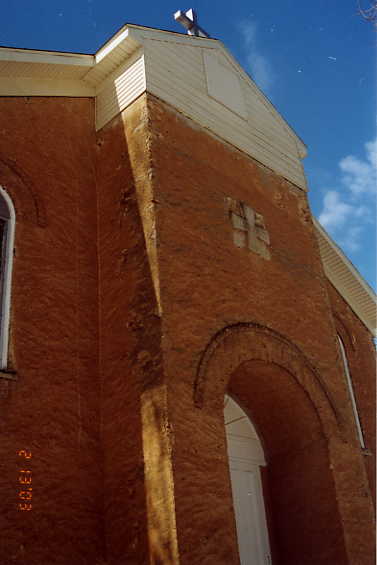
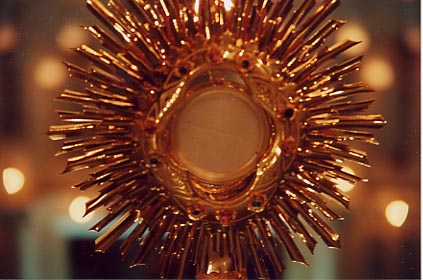
Come August 13th
Rita Ring will be there
There will be a Mass in China
on August 12th at 12 noon (China time)
August 13th at 12 noon
and on August 14th at 12:00.
Make a retreat
Live talk and rosary with Rita Ring
on August 13th.
This will be broadcast live
to the world on the internet.
A Catholic priest will be
listening and discerning
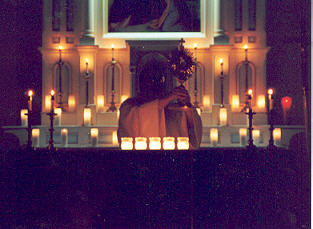
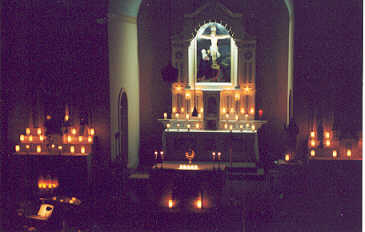
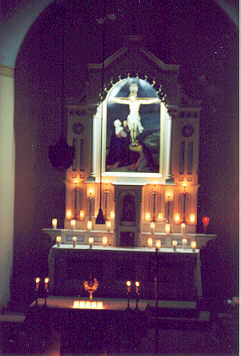
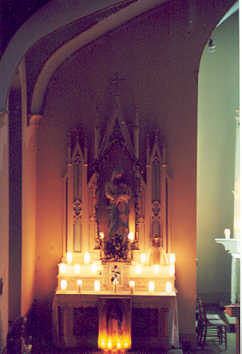
August 9, 2003
Jesus speaks: I suffered for your sins.
I am Jesus, I am the Divine God.
1 John 2: 22-23
Who is the liar,
if not one who claims
that Jesus is not the Christ?
This is the Antichrist,
who denies both the Father and the Son.
Whoever denies the Son
cannot have the Father either;
whoever acknowledges the Son
has the Father too.
August 9, 2003 message continues
Messenger: The day is today and who knows how we
will be asked to suffer or to put up
with the problems we have and try to
solve them according to God's will in
love.
If we think there will not be suffering or
problems we have missed the message
of the cross.
And in the suffering, I looked into His tender
eyes and I saw the crown placed about
His tender head, thorns piercing His
scalp, and Blood coming down from
the wounds. It was a slow stream
straight down his face and I looked in
His eyes and I saw not the hardness of
a man, but the love of the Son of God, I
saw compassion.
Whenever there is that suffering I see Him so
close as if I am staring into His face and
I feel His breathe before me. A closeness
I know in the suffering and waiting,
indecision can be tremendous suffering
for one who is anxiously waiting relief,
but He allows these moments of waiting,
of heartache, when we may feel our heart
could be bleeding from sorrow and in it,
it is a surrender to that moment of enduring
the suffering in love and relishing that deep
connection we have with Him while still in
pain.
It is to love for which we live. We live a life of
mystery, yet man tries to put it all together
like he knows the future and we don't.
Every day unfolds, every moment, like a new
package to examine its contents and see
how we are to engage in it to please
Him, our beloved God.
Tomorrow is promised to no man. We only have the
moment now to live. We must embrace it, open
the package, some packages have thorns, but
then a deeper connection of surrendering to Him
in the moment and saying, "yes" the suffering
hurts, the connection deeply with my God, the
connection with Jesus who carried His cross is
my delight —
Bitter-sweetness, a moment of suffering, a surrendering
and knowing only He can help me at this time
to endure it.
Oh bitter-sweet love of any moment when I so
deeply know Him and connect with Him and
rely on His Might and yet the thorns press
in and may make us bleed, our hearts
can be so torn inside because of deep love
and suffering it may feel as if our heart's pain
is so great.
Oh how He suffered in the garden for the souls He loved,
from all time, that would ignore Him and hate Him,
blaspheme Him and He went to the cross willingly
and suffered a brutal death for our sins so we
would be saved.
Oh yes, He is Savior, and I understand every word of
this song He gave me on the Feast of the Holy
Rosary October 7, 1994.
My first real song — the Song from Jesus
In minutes, as fast as I could play and write
He gave another missing piece to the Mission,
Shepherds of Christ and why Mary appears
on the building in Clearwater, Florida.
Every word is etched in my soul. He chiseled it
in my heart — DEEPLY — so I know the
depth of love He gave me with the Song.
I want to sing His words to you, I want to give
you the depth of the words of the Song
and all the Songs, given from the
Heart of Jesus, the One Who suffered, the One
Who rose victorious on the 3rd day.
Oh suffering —
Oh victory —
so minimally we understand things.
I know the deep cavern of His love —
the experience of December 15, 1995.
I want to express depth,
I want to talk about life in Him and
the power of the Mass.
I want the Song to be sung as I heard it with
all the emotion of Jesus who gave
Himself on the Cross —
It isn't a jumpy song so you can appeal to
the youth of today who sound as if their
music comes with crashing trash can lids
some times —
It is the Song of the Savior —
It is the breathe I know of Jesus
It is the words chiseled on my heart
coming from a Divine God who sings to me.
August 9, 2003 message continues
Messenger: deeply I reach to sing the words to you
from the notes and emotions etched
on my heart
The message clear —
at the end of the second millennium
I COME TO YOU
the message of God's Blue Books —
tender love letters from Jesus to
His beloved souls —
"I AM THE SON OF GOD"
"I AM JESUS"
"I LOVE YOU"
"I AM TRULY PRESENT IN
THE EUCHARIST"
DEPTH
I want to shout how deeply I
know His message in my soul.
A message from God.
A message from the Divine God.
A message from the man who suffered
a brutal death and died and
rose for you and me and He
sings to us.
I know His voice.
I know His words.
The tender words of the Sacred Heart whose
Heart is consumed with love for men.
Let me sing to you —
Let me read you the messages of the
Red Rosary book —
Messages from the Hearts of Jesus and
Mary as I know them as they were
delivered through my mouth and
etched on my heart.

August 9, 2003 message continues
Messenger: "I am truly present in the Eucharist
no less present than the
day I walked the earth."
"Mary carried the Son of God
in her womb"
Oh Holy Mary how wonderful
your womb, how precious
your Immaculate Heart ——
So in the clamor of the noise of the big
city and the wet streets and the
hard faces of the news, sorting out
and wanting to condemn and judge —
Jesus comes in the Cathedral —
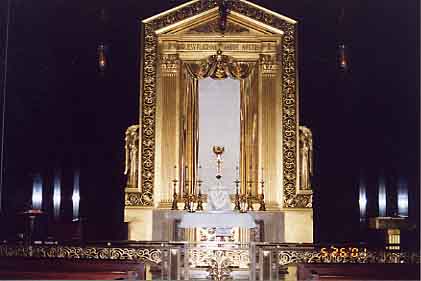
August 9, 2003 message continues
Messenger: He is truly present in the Eucharist —
I receive the Consecrated Host
I drink His Blood
I partake so deeply in the Mass, the Sacrifice
of Calvary, sacramentally made
present, begging for grace to be
outpoured on the troubled earth
so they will live in the truth,
praying so deeply for the priests,
the Church and the world — uniting
my prayer with all the angels and
saints and souls in purgatory and
crying to want the people of the earth
to be the way God wants them to be.
Oh how precious is the Mass.
Oh how precious is the priest.
How the devil wants to discredit this great gift.
Oh the Power of the Eucharist.
God truly present in His Divinity and Humanity
and He comes to me.
I receive Him.
I love Him —
I outpour my love to Him and I say
over and over again —
Oh God I love You so much.
I cry.
I unite to all 3 Persons so deeply in this
heavenly embrace at Mass — Mass
is when I so deeply unite to my God.
Oh God —
Oh beloved —
Oh make me more likened to You
in my love for others and
serving to do Your will —
What does it take to do God's will —
we cannot be attached to hurt and sad feelings
when we know God is asking us to
do something.
A person going into surgery may wish to
run the other way, but if he is
bleeding inside it may be the only
way to live, He cannot jump from
the table and run away.
God calls us to do things for Him. We see
the steps Jesus took on the way to the
cross. We see Him hang, with nails
in His hands and feet and He, being
God, could have come down from
the cross.
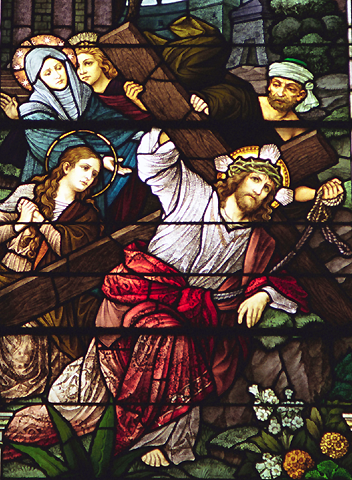
August 9, 2003 message continues
Messenger: He endured it, He went ahead,
He fell under the cross, He got up, He
went on.
Sometimes our hearts may be so
broken, we want to cry, but we know
God calls us to do something. We must
see the big picture, we must see how
God is calling us to promote the Kingdom,
that may be putting aside emotions that are
hurting or emotions from old memories
the devil is trying to manipulate so we won't
do something important to Jesus.
A mother and father may have to be firm
with a teen age son who wants to stay out
all night and it doesn't feel good confronting
issues of problems that need to be addressed
and solved.
Remember He carried the cross
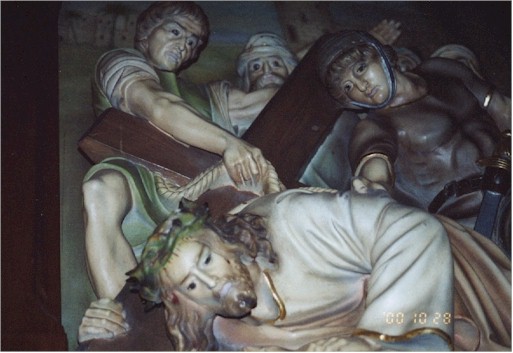
August 9, 2003 message continues
Messenger: Remember He fell under the cross
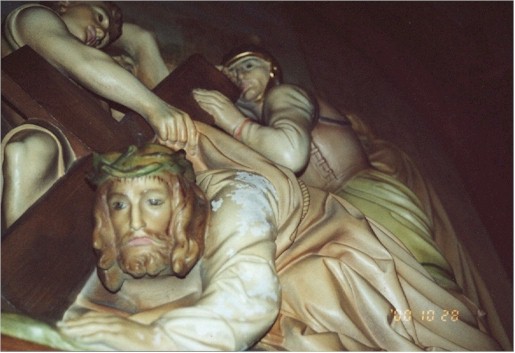
August 9, 2003 message continues
Messenger: Remember He mounted the cross and died
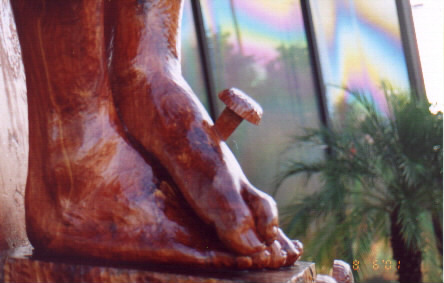
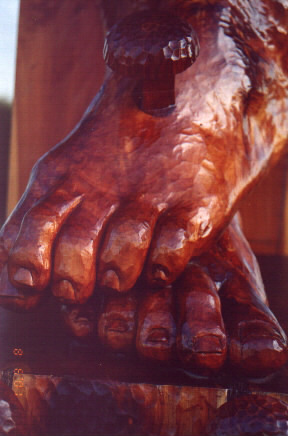
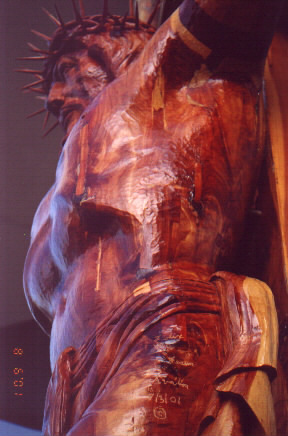
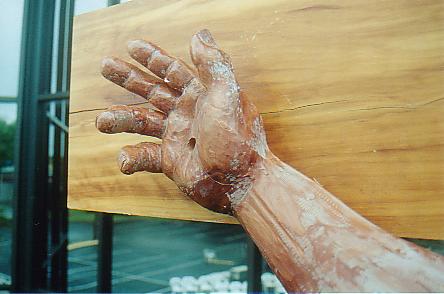
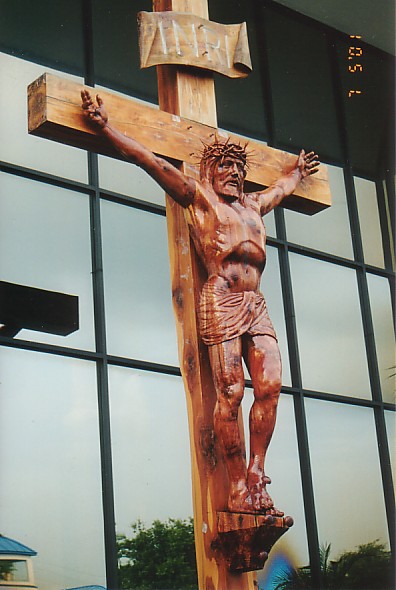
August 9, 2003 message continues
Messenger: Remember He rose on the 3rd day
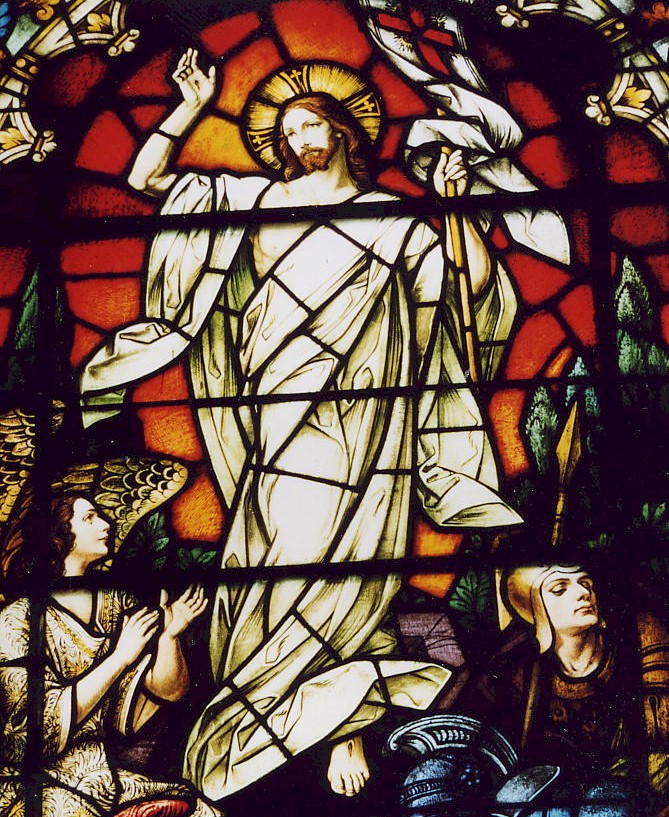
August 9, 2003 message continues
Messenger: One foot in front of the other —
don't focus on the emotions when it
can hurt your family and tear it apart —
focus on your love and what is
God's will at that moment —
Sometimes we have to do things in tears,
We must focus on God's will —
It may be hard for a young man to leave
his home and go in the seminary,
but think of the gift of a priest.
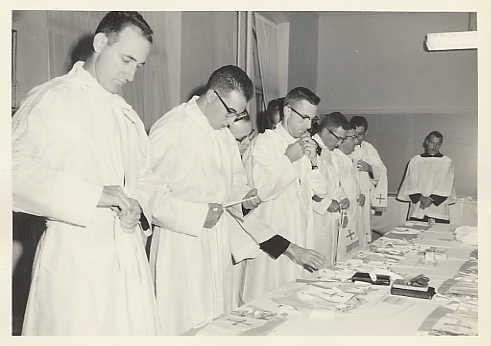
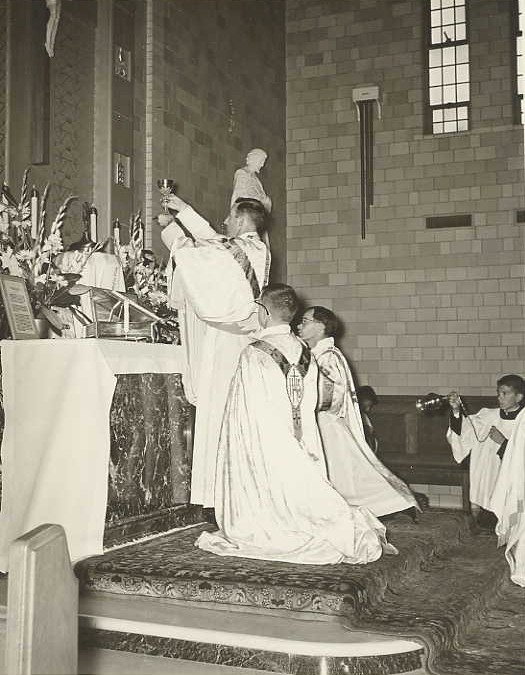
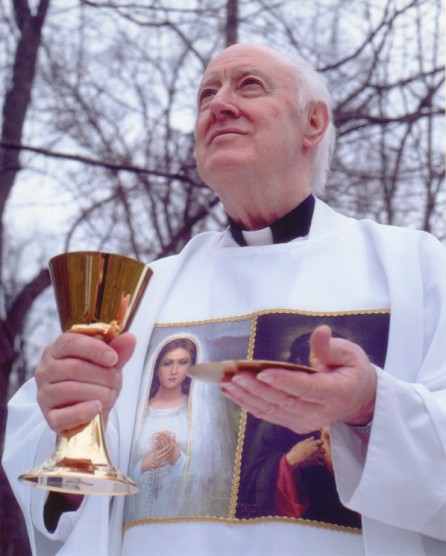
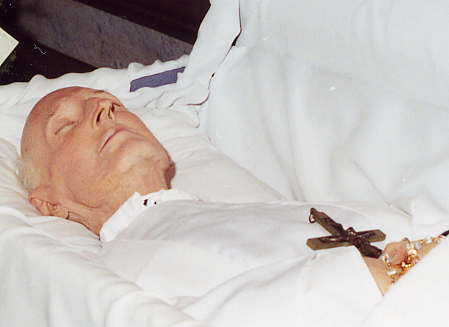
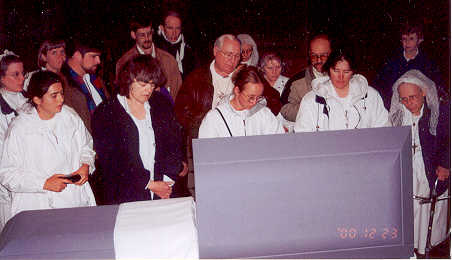
August 9, 2003 message continues
Messenger: We have a short time to live here —
very short —
babies come helpless —
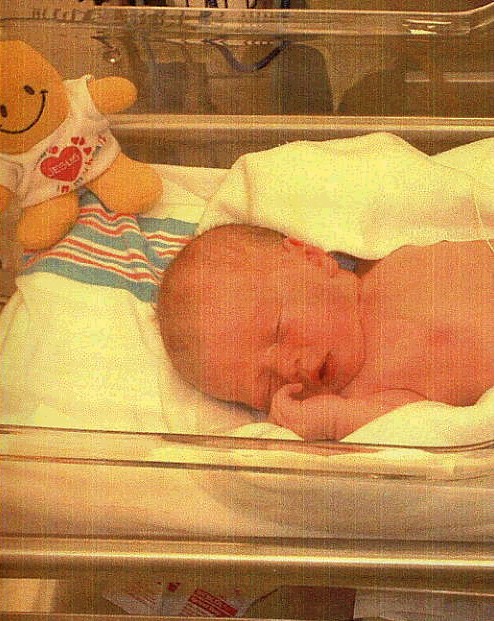
August 9, 2003 message continues
Messenger: Then they grow a little and walk and do things.

August 9, 2003 message continues
Messenger: Then soon they graduate —
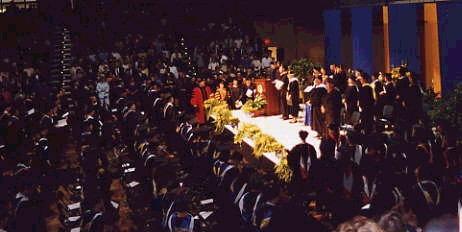
August 9, 2003 message continues
Messenger: get married or something


August 9, 2003 message continues
Messenger: Then some have babies etc.
some have callings and people that follow
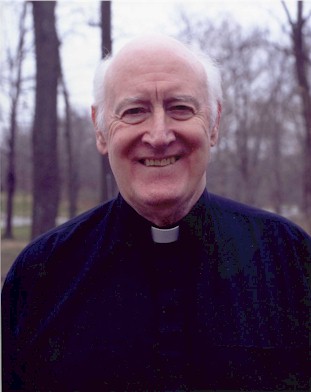
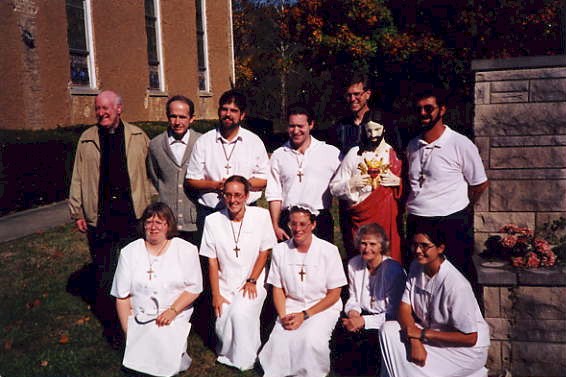
August 9, 2003 message continues
Messenger: SAY YES TO GOD'S WILL —
don't give into some hurt feelings that
hurt.
Suffering is part of the spiritual life
Matthew 17: 1-9
Six days later, Jesus took with him Peter and James and his brother John and led them up a high mountain by themselves. There in their presence he was transfigured: his face shone like the sun and his clothes became as dazzling as light. And suddenly Moses and Elijah appeared to them; they were talking with him. Then Peter spoke to Jesus. ‘Lord,’ he said, ‘it is wonderful for us to be here; if you want me to, I will make three shelters here, one for you, one for Moses and one for Elijah.’ He was still speaking when suddenly a bright cloud covered them with shadow, and suddenly from the cloud there came a voice which said, ‘This is my Son, the Beloved; he enjoys my favour. Listen to him.’ When they heard this, the disciples fell on their faces, overcome with fear. But Jesus came up and touched them, saying, ‘Stand up, do not be afraid.’ And when they raised their eyes they saw no one but Jesus. As they came down from the mountain Jesus gave them this order, ‘Tell no one about this vision until the Son of man has risen from the dead.’
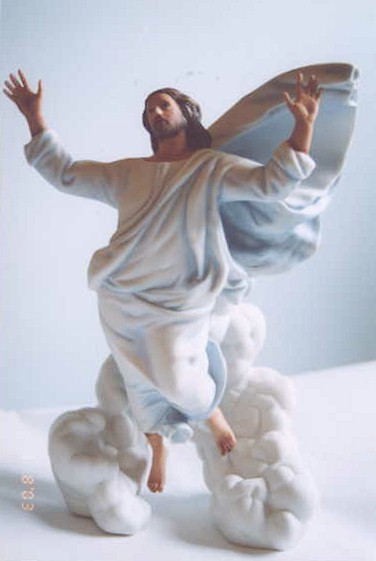
Matthew 26: 26-28
The institution of the Eucharist
Now as they were eating, Jesus took bread, and when he had said the blessing he broke it and gave it to the disciples. ‘Take it and eat,’ he said, ‘this is my body.’ Then he took a cup, and when he had given thanks he handed it to them saying, ‘Drink from this, all of you, for this is my blood, the blood of the covenant, poured out for many for the forgiveness of sins.
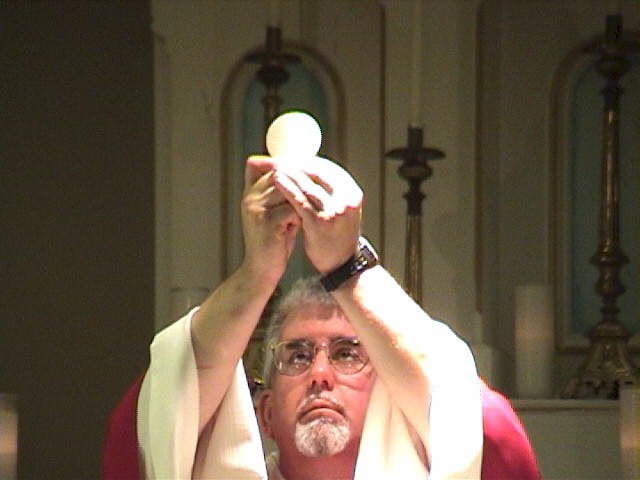
August 9, 2003 message continues
Messenger: We are here a short time —
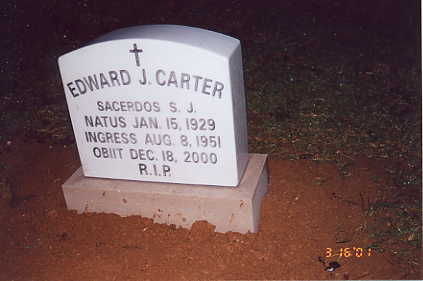
August 9, 2003 message continues
Messenger: Live in the moment
From a Lenten Homily, March 24, 2000
Live in the Moment
Today’s Gospel in its story certainly points ahead to Jesus in His Passion and death. And as we read passages such as this during the Lenten season, we are reminded once again that the Church in her Liturgy of the Word gives us an opportunity to undergo a purification, an ever deepening cleansing of ourselves so that we may be a more fit instrument
for receiving the great graces which are to be given to us at the time of the Resurrection memorial on Easter. And so all in all, Lent is a time of purification to prepare us for ever-greater gifts of the Lord. It’s a time of self-discipline, a time to renew our efforts to be self-disciplined in the service of the Lord. Self-discipline is an aspect of purification. And I suggest that one of the most difficult acts of self-discipline in the spiritual journey is to concentrate on the present moment. We have a very strong tendency to disregard the importance of the present moment by focusing in a wrong way on the past or in a wrong way on the future. There are proper occasions for thinking of the past and the future. For example, we have to learn from the past and we have to prepare for the future, but our great emphasis has to be upon the present. There is a Latin axiom which says, age quod agis, age quod agis, which means: do what you are doing, concentrate on the present. And of course we are familiar with that term in the history of spirituality: the sacrament of the present moment. And so the discipline of Lent certainly encourages us to include in a deeper self-discipline a greater determination to get as much as we can out of the present moment. People with a terminal illness have an opportunity as they prepare for death for increased prayer, contrition, love of God. However, some are taken very, very quickly. But for those who have the opportunity of knowing with some certainty the time of their death, I’m sure as they look back on their lives, they are saddened by the many times they did not use time and opportunities for the service of the Lord properly, and are overjoyed at those times in which they did use the present opportunity properly. A great means we have of living in the present properly is a greater focus upon our Lord. For if I have that awareness of the fact I am united with Jesus here and now, why should I be concerned so much about the future or the past? Yes, a great help in living in the present and deriving all the good we can from it for ourselves and others is an ever greater focus upon Jesus, because the more I focus upon Jesus and the more I live with Him in the present moment, the more I am satisfied with the present moment. And so let us in our Lenten activity resolve to grow in that self-discipline - which is very difficult at times - to really live in the presence with the fullness of our being as much as is possible, with the help of God’s grace. Now is the day of salvation. Now is the day of salvation.
end of Father Carter's homily
August 9, 2003 message continues
Messenger: A synopsis of the Spiritual Life
SPECIAL ISSUE!
This is a special, expanded issue for the purpose of giving an overview of the spiritual life. At times it is profitable for us to review briefly the various elements which comprise the spiritual life. We hope this special issue will be helpful for such an exercise, and that it will speak to the heart as well as to the mind.
WE ARE EXPANDING OUR READERSHIP!
We are expanding our circulation by explicitly inviting to our readership those who are not priests, but who are interested in the spiritual life.
The Newsletter will still be written for priests in a special way. Yet we feel much of the material will also be of interest to those who are not priests.
To reflect the fact that we are now expanding our readership to include all interested parties, we think it is appropriate to offer a new act of consecration which is not worded for priests only, but one suitable for all.
CONTENTS
- An Overview of the Spiritual Life
- The Indwelling of the Trinity and the Life of Grace
- Life In and With Jesus
- The Father's Will for Us--Our Source of Peace
- The Holy Spirit and Mary
- The Church
- The Sacraments
- The Eucharist
- Priesthood
- Prayer
- Relationship with Others
- The Christian and the World
- Purification
- The Vision of Faith
- Trust in God
- Humility
- Strength in Weakness
- Living in the Present Moment
- Surrender to God
- Mind and Heart
- The Mystical Life
- Heart of Christ, Heart of Mary
- The Theology of Consecration
- Act of Consecration
- A Prayer for Priests
- Letters
- Notes
- Masthead
An Overview of the Spiritual Life
I am the good shepherd: the good shepherd is lays down his life for his sheep. The hired man, since he is not the shepherd and the sheep do not belong to him, abandons the sheep as soon as he sees a wolf coming, and runs away, and then the wolf attacks and scatters the sheep; he runs away because he is only a hired man and has no concern for the sheep. I am the good shepherd; I know my own and my own know me, just as the Father knows me and I know the Father; and I lay down my life for my sheep. (Jn 10:11-151)
The Good Shepherd gave His life so that we may have life and have it in abundance. In this issue we offer an overview of the life Jesus came to give. We begin by presenting a brief sketch of the spiritual life. This will be followed by content which speaks in a more detailed manner about the various dimensions of the spiritual life -- our life in Christ.
A Sketch of the Spiritual Life
The Christian life is rooted in the great event of the Incarnation. We must consequently always focus our gaze upon Christ, realizing that the Father has spoken to us in the life, death, resurrection, and ascension of Jesus. It only remains for us, then, to strive to understand with greater insight the inexhaustible truth of the Word Incarnate (Heb 1:1-2).
What was the condition of the human race at the time of Christ’s coming? In some ways, people were much the same as we are today. There were those just being born into this world of human drama. There were those who, in death, were leaving it, some of whom had grasped but little of life’s meaning. There were those who were healthy and vigorous. There were those who were sick and lame. Some especially felt the burdens, the grief, the suffering of the human condition. Others were ebullient and desired all the pleasures life could provide. There was some good being accomplished. Immorality, however, was rampant. What St. Paul tells us concerning the time that immediately followed Christ’s existence certainly could also be applied to the time of His entrance into the world. It is, in short, an ugly picture that St. Paul depicts for us (Rom 1:22-32).
Into such a depraved condition Jesus entered, with a full and generous Heart, to lead the human race from the depths of sinfulness to the vibrant richness of a new life in Himself. Through His enfleshment, this Christ became the focal point of all history. The authentic hopes and dreams of the human family, now so overshadowed by the ugliness of sin, came converging upon this Christ. He would gather them up in Himself, give them a new luster and brilliance and dynamism, and would lead the human family back to the Father in the Holy Spirit.
Christ was radically to release us from the dominion of sin and elevate us to a new level of existence. This life Christ has given us is not a type of superstructure which is erected atop human existence. Although nature and grace are distinct, they do not lie side by side as separate entities. Rather, grace permeates nature. The Christian is one graced person. The Christian is one who has been raised up, caught up, into a deeper form of life in Christ Jesus. Nothing that is authentically human in the life of the Christian has been excluded from this new existence. Whatever is really human in the life of the Christian is meant to be an expression of the Christ-life. The simple but deep joys of family life, the wonderment at nature’s beauty, the warm embrace of a mother for her child, the agony of crucial decision making, the success or frustration that is experienced in one’s work, the joy of being well received by others, and the heartache of being misunderstood—all these experiences are intended to be caught up in Christ and made more deeply human because of Him.
Jesus has come, then, not to destroy anything that is authentically human, but to perfect it by leading it to a graced fulfillment. The more God-like we become through Christ, the more human we become.
We, through our incorporation into Christ which occurs at Baptism, are meant to relive the life, death, and resurrection of Jesus. In doing so, we are not only accomplishing our own salvation, but we are assisting in the salvation of others also. The Incarnation continues all the time. Christ, or course, is the one Who fundamentally continues the Incarnation. But He enlists our help. The world no longer sees Jesus, no longer is able to reach out and touch Him. We are the ones who now, in some way, make Christ visible and tangible. In union with the invisible, glorified Christ, and depending on Him as our source of life, we continue the Incarnation in its visible and temporal dimensions. This is our great privilege. This is our great responsibility.
The Christian is initiated into the mystery of Christ, into his or her role in prolonging the Incarnation, through Baptism (Rom 6:3-4).
It is not sufficient, however, that we be incorporated into Christ through Baptism. All forms of life require nourishment. So, too, our life in Christ must be continually nourished. How can we continually keep in contact with Christ? There are various ways as we live our life within the Church. We contact Christ in a most special way through the liturgy, above all in the Eucharistic liturgy. Through our most special and most personal meeting with Jesus in the Mass, we are more deeply incorporated into Christ. Also, we should remember that all the sacraments make up part of the Church’s liturgy.
The reading of Scripture provides another special opportunity for meeting Jesus. This is true for both Old and New Testaments. The Old Testament prefigures the New Testament and leads to it. It is obvious, however, that we meet Christ especially in the pages of the New Testament. How true it is to say that not to be familiar with Scripture is not to know Jesus properly. We should resolve to read from Scripture daily.
We also meet Jesus in our interaction with others. Everyone we meet, everyone we serve, is in the image of Jesus. We have to take the means to grow in this awareness. If I truly believe that everyone has been redeemed by the blood of Jesus, how should I treat everyone?
These, then, are some of the ways we keep in contact with Jesus. Common to the various ways of meeting Jesus is a certain degree of prayerful reflection. Our contact with Jesus in the liturgy, in Scripture, and in our interaction with others, and so forth, will not be all that it should be unless we are persons of prayer. The light and strength of prayer enables us to keep in contact with Jesus as we should.
We live out our Christ-life in an atmosphere of love. Indeed, the life Jesus has given us is centered in love. It has its origins in the mysterious love of God (Jn 3:16).
Our new life in Jesus has arisen out of God’s fathomless love. Christ, in His descent into human flesh, has established a milieu of love. The life He came to give can flourish only in the framework of love. Indeed, we can summarize the meaning of the Christian life by stating that it is our loving response to God’s love. The pierced Heart of Jesus, this Heart which shed its last drop of blood in the greatest love for each one of us, is the symbol of God’s tremendous love for us. Christ’s Heart also calls us to respond by giving ourselves in love to God and neighbor. Yes, Jesus invites us to respond to God’s love by giving ourselves in love to Him in an ever closer union. The more closely we are united to Him, the greater is our capacity to love God and neighbor. The more closely we are united with Jesus, the more closely He unites us to the Father in the Holy Spirit, with Mary our Mother at our side.
The Indwelling of the Trinity and the Life of Grace
The spiritual life, the life of holiness, begins at Baptism. Archbishop Luis Martinez says:
"When we are born we are endowed by God with all we need for our human life, a complete organism, and a soul with the full range of faculties. Of course they are not all developed from birth, but we have them then as the source of everything we are going to need in life. And thus it is also in the spiritual order. When someone is baptized, he receives in all its fullness that supernatural world which the Christian carries within his soul. He receives grace, which is a participation of the nature of God; the theological virtues, which put him in immediate contact with the divine; the moral virtues, which serve to regulate and order all his life; and the gifts of the Holy Spirit, the divine, mysterious receivers for picking up the Spirit’s inspirations and movements."2
Another author states: "The Three Divine Persons inhabit the sanctuary of our soul, taking their delight in enriching it with supernatural gifts and in communicating to us a Godlike life, similar to theirs, called the life of grace.
"All life, however, implies a threefold element: a vital principle that is, so to speak, the source of life itself; faculties which give the power to elicit vital acts; and lastly, the acts themselves which are but its development and which minister to its growth. In the supernatural order, God living within us produces the same elements. He first communicates to us habitual grace (the life of sanctifying grace) which plays the part of a vital supernatural principle. This principle deifies, as it were, the very substance of the soul and makes it capable, though in a remote way, of enjoying the Beatific Vision and of performing the acts that lead to it.
"Out of this grace spring the infused virtues and the gifts of the Holy Spirit which perfect our faculties and endow us with the immediate power of performing Godlike, supernatural, meritorious acts.
"In order to stir these faculties into action, He give us actual graces which enlighten our mind, strengthen our will, and aid us both to act supernaturally and to increase the measure of habitual grace that has been granted to us.
"Although this life of grace is entirely distinct from our natural life it is not merely superimposed on the latter. It penetrates it through and through, transforms it and makes it divine. It assimilates whatever is good in our nature, our education and our habits. It perfects and supernaturalizes all these various elements, directing them toward the last end, that is toward the possession of God through the Beatific Vision and its resultant life." 3
Our being in the state of sanctifying of grace and the special indwelling of the Persons of the Trinity within us always exist together. We cannot have the one without the other. Our life of grace, which is a sharing in Trinitarian life, allows us to know and love Father, Son, and Holy Spirit in a most intimate fashion. Through grace we are in the image of the Trinity, and we enjoy special relationships with the Divine Persons.
Again, we listen to the words of Archbishop Martinez as he speaks about our relationships with the Divine Persons:
"Love, we have said, is the foundation of devotion to the Holy Spirit, as it is also the foundation of Christian perfection. But love as a reflection of God, as His own image, is something that encloses within its simplicity a boundless wealth and a variety of forms. Who can fathom the depths of love?
"Human love in all its manifestations is admirably in harmony with the love of charity; it is confident in filial love, trusting in friendship, sweet and fruitful in the love of husband and wife, disinterested and tender in the love of a mother. Our love of God must include all these forms of human love; every fiber of our heart must vibrate when the harmonious and full canticle of love bursts forth from it. But since God is one in essence and triune in Persons, our love for Him takes on a particular aspect accordingly as it is directed to each one of the divine Persons.
"Our love for the Father is tender and confident like that of children; eager to glorify Him as His only-begotten Son taught us to do by word and example. Love for the Father is the intense desire to have His will fulfilled on earth as it is in heaven. Our love for the Son, who willed to become flesh for us, is characterized by the tendency to union with Him and transformation into Him; by imitation of His example, participation in His life, and the sharing of His sufferings and His Cross. The Eucharist, mystery of love, of sorrow, and of union, reveals the characteristics of this love.
"Love for the Holy Spirit also has its special character, which we should study in order completely to understand devotion to Him. We have explained how the Holy Spirit loves us, how He moves us like a divine breath that draws us to the bosom of God, like a sacred fire that transforms us into fire, like a divine artist who forms Jesus in us. Surely, then, our love for the Holy Spirit should be marked by loving docility, by full surrender, and by a constant fidelity that permits us to be moved, directed, and transformed by His sanctifying action.
"Our love for the Father tends to glorify Him; our love for the Son, to transform ourselves into Him; our love for the Holy Spirit, to let ourselves be possessed and moved by Him."4
Life In and With Jesus
The spiritual life centers in Christ. Here are words from the Jerusalem Catecheses: "When we were baptized into Christ and clothed ourselves in him, we were transformed into the likeness of the Son of God. Having destined us to be his adopted sons, God gave us a likeness to Christ in his glory, and living as we do in communion with Christ, God’s anointed, we ourselves are rightly called ‘the anointed ones.’ " 5
Msgr. Robert Guste says: "Ideal Catholics held up to us by the Church are the saints. As you read their lives, what do you notice? One after the other, they were men and women who had a deep, personal relationship with Our Lord Jesus Christ. Their hearts were on fire with love for Him..." 6
When we are baptized we are incorporated into Christ’s paschal mystery of death and resurrection. St. Paul speaks of this marvelous union with Jesus: You cannot have forgotten that all of us, when we were baptised into Christ Jesus, were baptised into his death. So by our baptism into his death we were buried with him, so that as Christ was raised from the dead by the Father’s glorious power, we too should begin living a new life. (Rm 6:3-4).
Christ has structured the Christian life by the way He lived, died, and rose from the dead. It is obvious, then, as Paul tells us above, that the pattern of death-resurrection must be at the heart of the Church’s life. Individually and collectively, we continually die with Christ so that we may continually rise with Him. Thus we pass over in a process of ongoing religious transition to a greater participation in Christ’s resurrection. It is true that our participation in Christ’s resurrection will reach its completion only in eternity. Nevertheless, we begin the life of resurrection here upon the earth, in the here and now of human life, in the midst of joy and pain; in the experience of success and failure, in the sweat of our brow, in the enjoyment of God’s gifts. As Christians, we should have a sense of dynamic growth concerning our here and now life of resurrection.
We cannot maintain the life of resurrection or grow in it without a willingness to suffer. This does not mean that we need to feel overwhelmed and heavily burdened in our lives. The greater portion of suffering for most Christians seems to be an accumulation of ordinary hardships, difficulties, and pains. At times, however, deep suffering, even suffering of agonizing proportions, can enter into one’s life. Whether the sufferings one encounters are of either the more ordinary variety or the more rare and extreme type, Christians must convince themselves that to relate properly to the cross is to grow in resurrection, and growth in resurrection means we will also have an increased capacity to help give resurrection to others.
- The Church invites us to share deeply in the passion of Christ, in the cross of Christ. She does so that we might share deeply in His life of resurrection—here and hereafter. The more we die with Christ, the more we share in His life of resurrection—here and hereafter. Our ultimate goal here below is not the cross, but resurrection—the newness of life the cross leads to - here below as well as in eternity.
We are meant to share in all of the mysteries of Christ here below—we are meant to relive them in our own lives. And all of these mysteries are directed to the crowning mystery of Jesus, His resurrection: "As the Church is ever re-enacting, during all the ages, the life story of her Divine Spouse—undergoing in the Mystical Body what He suffered in His Natural Body, so it must be too, in some measure, for every individual Christian that lives in real unity with Christ. It was thus that the saints understood the life of the Divine Master. They not merely contemplated it, they lived it. This was the source of the immense sympathy they were capable of experiencing for Him in His different states. They felt in a certain measure what He felt, and what is true of Our Lord’s life considered as a whole must be true in no imperfect or limited manner of that which was the supreme and crowning mystery in that life—namely, the Resurrection. This must be, not merely a fact in Christian history, but a phase of Christian experience …We do not readily perceive that, in God’s plan, not only the Cross, but the Risen Life that followed it, is meant to be part of our terrestrial existence. Christ did not pass from the Cross straight to heaven. The Christian is not meant to do so either. In the case of Jesus the Cross preceded, prepared and prefaced a risen life on earth. In the case of the Christian the Cross is meant to play a somewhat similar role—that is, to be the prelude to a risen life, even here below.
"The Cross cannot be completely understood except it is viewed in the full light of the Resurrection. It is the latter, not the former, that is the ultimate mystery for us…The Cross is a means, not an end; it finds its explanation only in the empty tomb; it is an entrance into life, not a mode of death. Any death that enters into God’s plan must necessarily issue forth in life. If He lays upon us the necessity of dying it is in order that we may live…In order that we may live as we ought, our rebellious nature must be crucified. Crucifixion always remains the only mode of salvation.
"God sends trials and crosses simply to deaden in us the activity of the forces that make for the decay of the spiritual life, in order that that spiritual life may develop and expand unimpeded. According as the life of perverse nature ebbs away from us on our cross united with Christ’s, the Divine Life that God has placed in all whom He has called begins to make itself more manifest and to display increased vigour and vitality…It is to that Resurrection, that life in death, that God directs all the circumstances of our life—it is the object He aims at in His dealing with us." 7
In his above words, Fr. Edward Leen, C.S.Sp., speaks about a special episode of our participation in the resurrection of Jesus. He speaks of our Christ-life, our life of grace, in the highly developed state. We should all strive for this state. We must realize, however, that all those who live in the state of grace are, in an essential way, living the life of resurrection. They are alive in Christ Jesus.
The following words of St. John Eudes remind us of the glorious goal the Christian is called to: the most intimate union with Jesus.
"I ask you to consider that our Lord Jesus Christ is your true head and that you are a member of his body. He belongs to you as the head belongs to the body. All that is his is yours: breath, heart, body, soul and all his faculties. All of these you must use as if they belonged to you, so that in serving him you may give him praise, love and glory. You belong to him as a member belongs to the head. This is why he earnestly desires you to serve and glorify the Father by using all your faculties as if they were his.
"He belongs to you, but more than that, he longs to be in you, living and ruling in you, as the head lives and rules in the body. He desires that whatever is in him may live and rule in you: his breath in your breath, his heart in your heart, all the faculties of his soul in the faculties of your soul...
"You belong to the Son of God, but more than that, you ought to be in him as the members are in the head. All that is in you must be incorporated into him. You must receive life from him and be ruled by him. There will be no true life for you except in him, for he is the one source of true life. Apart from him you will find only death and destruction. Let him be the only source of your movements, of the actions and the strength of your life.
"Finally, you are one with Jesus as the body is one with the head. You must, then, have one breath with him, one soul, one life, one will, one mind, one heart. And he must be your breath, heart, love, life, your all. These great gifts in the follower of Christ originate from baptism. They are increased and strengthened through confirmation and by making good use of other graces that are given by God. Through the holy eucharist they are brought to perfection."8
St. Ignatius of Antioch was deeply consumed with love for Jesus: "At last I am well on the way to being a disciple. May nothing, seen or unseen, fascinate me, so that I may happily make my way to Jesus Christ! Fire, cross, struggles with wild beasts, wrenching of bones, mangling of limbs, crunching of the whole body, cruel tortures inflicted by the devil—let them come upon me, provided only I make my way to Jesus Christ."9
Cardinal Newman tells us: "Everyone who breathes, high and low, educated and ignorant, young and old, man and woman, has a mission, has a work. We are not born at random... God sees every one of us; He creates every soul, He lodges it in a body, one by one, for a purpose. He needs, He deigns to need, every one of us."10
Because of the uniqueness of each Christian's existence, he or she presents Christ with a unique opportunity. Each Christian has the vocation to offer Christ his or her humanity so that Jesus can live in that individual in a special way. This Jesus is Priest, Prophet and King. To the extent that an individual Christian offers his or her humanity to Jesus, that person has an unique opportunity to help to continue the work of the redemption--an opportunity that no one else can fulfill. Likewise, to the extent that an individual fails to offer his or her humanity to Christ, Jesus loses the opportunity to continue His redemptive work according to that person's uniqueness.
Concerning the prophetic or teaching office of Christ, each of us has the ever-present opportunity of witnessing to the truth of Christ by the way we live. Mother Teresa gives a striking example of this. She says: "I received a letter from a wealthy Brazilian man. He assured me that he had lost his faith -- not just his faith in God but his faith in humanity as well. He was fed up with his situation and everything around him. He only thought about suicide.
"One day, walking on a busy street downtown, he saw a television set in a store window. The program was about our Home for the Dying in Calcutta, and it showed our Sisters taking care of the sick and the dying.
"The man confessed that when he saw that, he felt the urge to kneel and pray, after many years of not ever kneeling or praying.
"From that day on, he recovered his faith in God and in humanity, and he was convinced that God still loves him."11
St. Paul, one who loved Jesus so deeply, has left us these words: "But we hold this treasure in pots of earthenware, so that the immensity of the power is God’s and not our own. We are subjected to every kind of hardship, but never distressed; we see no way out but we never despair; we are pursued but never cut off; knocked down, but still have some life in us; always we carry with us in our body the death of Jesus so that the life of Jesus, too, may be visible in our body. Indeed, while we are still alive, we are continually being handed over to death, for the sake of Jesus, so that the life of Jesus, too, may be visible in our mortal flesh." (2 Cor 4:7-11).
Here are words from St. Claude La Columbière, one of the great apostles of devotion to the Heart of Christ. Speaking to Jesus, Claude says:
You share my burdens,
You take them upon yourself.
You listen to me fondly when I tell you my troubles.
You never fail to lighten them.
I find You at all times and in all places.
You never leave me.
I will always find You wherever I go.Old age or misfortune will not cause You to abandon me.
You will never be closer to me than
When all seems to go against me.
No matter how miserable I may be,
You will never cease to be my friend.You tolerate my faults with admirable patience.
You are always ready to come to me, if I so desire it.Jesus, may I die praising you!
May I die loving you!
May I die for the love of you.12
The Father's Will for Us - Our Source of Peace
- Pope John Paul II instructs us: "The Church, as a reconciled and reconciling community, cannot forget that at the source of her gift and mission of reconciliation is the initiative, full of compassionate love and mercy, of that God who is love (see 1 John 4:8) and who out of love created human beings (see Wisdom 11:23-26; Genesis 1:27: Psalms 8:4-8)…He created them so that they might live in friendship with Him and in communion with one another.
"God is faithful to His eternal plan even when man, under the impulse of the evil one (see Wisdom 2:24) and carried away by his own pride, abuses the freedom given to him in order to love and generously seek what is good, and (instead) refuses to obey his Lord and Father. God is faithful even when man, instead of responding with love to God’s love, opposes Him and treats Him like a rival, deluding himself and relying on his own power, with the resulting break of relationship with the One who created him. In spite of this transgression on man’s part, God remains faithful in love.
"It is certainly true that the story of the Garden of Eden makes us think about the tragic consequences of rejecting the Father, which becomes evident in man’s inner disorder and in the breakdown of harmony between man and woman, brother and brother (see Genesis 3:12 ff; 4:1-16). Also significant is the Gospel parable of the two brothers (the parable of the ‘prodigal son’; see Luke 15:11-32) who, in different ways, distance themselves from their father and cause a rift between them. Refusal of God’s fatherly love and of His loving gifts is always at the root of humanity’s divisions.
"But we know that God…like the father in the parable (of the prodigal son), does not close His heart to any of His children. He waits for them, looks for them, goes to meet them at the place where the refusal of communion imprisons them in isolation and division. He calls them to gather about His table in the joy of the feast of forgiveness and reconciliation.
"This initiative on God’s part is made concrete and manifest in the redemptive act of Christ, which radiates through the world by means of the ministry of the Church." 13
In the evening of that same day, the first day of the week, the doors were closed in the room where the disciples were, for fear of the Jews. Jesus came and stood among them. He said to them, ‘Peace be with you,’ and, after saying this, he showed them his hands and his side. The disciples were filled with joy at seeing the Lord, and he said to them again, ‘Peace be with you. As the Father sent me, so am I sending you.’ (Jn 20:19-21).
The world needs peace. Individual nations need peace and families need peace. The Church needs peace. Each of us individually needs peace. We must work for peace through prayer, fasting, and other Christ-like activities.
And just what do we mean by peace? St. Augustine says peace is the tranquility of order. God has put order into His creation and this order must be respected and promoted if peace is to prevail. To the extent that the human family lives according to God’s will—lives according to the order or the plan God has established for creation—to that extent does peace exist in the various segments of human society. To the extent there are violations of God’s plan, of His will, to that extent peace is absent.
If we are to be instruments of peace, we ourselves must be at peace. Our personal peace is that tranquility of order which results from our doing God’s will. The more we are united through love with God in the doing of His will, the more we experience peace.
Sometimes the sense of peace we experience is so strong that we can "feel" it pulsating throughout our being. These are periods of what we may call the experience of extraordinary peace. This type of peace usually is not an everyday occurrence.
Most of the time we live immersed in a more subdued kind of peace which results from our daily attempts to do God’s will in love. It is that peace which is a welcome and sustaining companion as we walk the path of everyday life with its usual assortments of joys and disappointments, successes and failures, laughter and tears.
Occasionally, very deep suffering may enter our lives. It is during these times that we need special determination to preserve ourselves in a basic peace of spirit despite the very significant pain. One may wonder how a person can be at peace amidst the experience of great suffering. St. Francis de Sales in one of his writings—and I have not been able to locate the exact place—offers an analogy which I think is very helpful. He asks us to picture an ocean body of water at the time of a violent storm. The surface of the water becomes extremely turbulent. Francis asks us, as we use our imagination , to descend beneath the surface of the water into its depth. What do we find? The more deeply one descends away from the turbulent surface, the calmer the water becomes. Likewise, says the saint and doctor of the Church, should it be with us during times of profound suffering. Although the surface of the spirit may be very agitated, one can still maintain basic peace of spirit by going deep down to one’s center where God is more directly experienced. Here the person experiences a calm, a basic peace, although the suffering remains.
If we are trying to do God’s will in love, God intends us to be at peace. The more we conform to God’s will, the more we are living according to the order He intends for us. In turn, the more our lives are in harmony with the order established by God, the more we experience peace—peace being the tranquility of order. The more we ourselves live in this manner, the more fit instruments we become for promoting God’s order and consequent peace throughout the various segments of society.
St. Dominic was an outstanding witness to the peace of the Lord: "Dominic possessed such great integrity and was so strongly motivated by divine love, that without doubt he proved to be a bearer of honor and grace. He was a man of great equanimity, except when moved to compassion and mercy. And since a joyful heart animates the face, he displayed the peaceful composure of a spiritual man in the kindness he manifested outwardly and by the cheerfulness of his countenance."14
Shortly before he was to die from cancer, Joseph Cardinal Bernardin left us these inspiring words about peace: "It is the first day of November, and fall is giving way to winter. Soon the trees will lose the vibrant colors of their leaves and snow will cover the ground. The earth will shut down, and people will race to and from their destinations bundled up for warmth. Chicago winters are harsh. It is a time of dying.
"But we know that spring will soon come with all its new life and wonder.
"It is quite clear that I will not be alive in the spring. But I will soon experience new life in a different way…
"What I would like to leave behind is a simple prayer that each of you may find what I have found—God’s special gift to us all: the gift of peace. When we are at peace, we find the freedom to be most fully who we are, even in the worst of times. We let go of what is non-essential and embrace what is essential. We empty ourselves so that God may more fully work within us. And we become instruments in the hands of the Lord."15
St. Teresa of Avila, one of the three women doctors of the Church, tells us how the spiritual life is summed up in loving conformity to the Father’s will:
"All that the beginner in prayer has to do -- and you must not forget this, for it is very important -- is to labor and to be resolute and prepare himself with all possible diligence to bring his will in conformity with the will of God. As I shall say later, you may be quite sure that this comprises the very greatest perfection which can be attained on the spiritual road."16
Again she states: "...love consists ... in the firmness of our determination to try to please God in everything." 17
The Holy Spirit and Mary
The late Archbishop Luis M. Martinez of Mexico strikingly speaks of the ongoing cooperation of Mary with the Holy Spirit regarding the reproduction of Jesus within us: "Christian life is the reproduction of Jesus in souls…
"Now, how will this mystical reproduction be brought about in souls? In the same way in which Jesus was brought into the world, for God gives a wonderful mark of unity to all His works. Divine acts have a wealth of variety because they are the work of omnipotence; nevertheless, a most perfect unity always shines forth from them because they are the fruit of wisdom; and this divine contrast of unity and variety stamps the works of God with sublime and unutterable beauty.
"In His miraculous birth, Jesus was the fruit of heaven and earth…The Holy Spirit conveyed the divine fruitfulness of the Father to Mary, and the virginal soil brought forth in an ineffable manner our most loving Savior, the divine Seed, as the prophets called Him…
"That is the way He is reproduced in souls. He is always the fruit of heaven and earth.
"Two artisans must concur in the work that is at once God’s masterpiece and humanity’s supreme product: the Holy Spirit and the most holy Virgin Mary. Two sanctifiers are necessary to souls, the Holy Spirit and the Virgin Mary, for they are the only ones who can reproduce Christ.
"Undoubtedly, the Holy Spirit and the Virgin Mary sanctify us in different ways. The first is the Sanctifier by essence; because He is God, who is infinite sanctity; because He is the personal Love that completes, so to speak, the sanctity of God, consummating His life and His unity, and it belongs to Him to communicate to souls the mystery of that sanctity. The Virgin Mary, for her part, is the co-operator, the indispensable instrument in and by God’s design. From Mary’s maternal relation to the human body of Christ is derived her relation to His Mystical Body which is being formed through all the centuries until the end of time, when it will be lifted up to the heavens, beautiful, splendid, complete, and glorious.
"These two, then, the Holy Spirit and Mary, are the indispensable artificers of Jesus, the indispensable sanctifiers of souls. Any saint in heaven can co-operate in the sanctification of a soul, but his co-operation is not necessary, not profound, not constant: while the co-operation of these two artisans of Jesus of whom we have just been speaking is so necessary that without it souls are not sanctified (and this by the actual design of Providence), and so intimate that it reaches to the very depths of our soul. For the Holy Spirit pours charity into our heart, makes a habitation of our soul, and directs our spiritual life by means of His gifts. The Virgin Mary has the efficacious influence of Mediatrix in the most profound and delicate operations of grace in our souls. And, finally, the action of the Holy Spirit and the co-operation of the most holy Virgin Mary are constant; without them, not one single character of Jesus would be traced on our souls, no virtue grow, no gift be developed, no grace increased, no bond of union with God be strengthened in the rich flowering of the spiritual life.
"Such is the place that the Holy Spirit and the Virgin Mary have in the order of sanctification. Therefore, Christian piety should put these two artisans of Christ in their true place, making devotion to them something necessary, profound, and constant." 18
The Church
We live out our spiritual lives within the Church. The Church is a multi-splendored reality. Let us reflect upon some of the key ideas connected with the Church.
Henri de Lubac states: "The Church is a mysterious extension in time of the Trinity, not only preparing us for the life of unity but bringing about even now our participation in it. She comes from and is full of the Trinity. She is for us -- in a favourite phrase of Bossuet -- ‘Jesus Christ … communicated’. She is ‘the Incarnation continued.’ She is, as Dietrick Bonhoeffer used to say, ‘the presence of Christ on earth’ --- she speaks with ‘the authority of Christ living and present in her.’… St. Paul applies to her this same word ‘mystery’ which he had first used of Christ. She is after all, the spouse of Christ and his body." 19
Fr. Bruno Forte tells us: "The Church comes from the Trinity, reflects in itself the Trinitarian communion—oneness in diversity—and journeys toward the Trinity, to the final handing over of all things to Christ, so that he might hand them over to the Father and God might be all in all. As ‘a people gathered in the unity of the Father and of the Son and of the Holy Spirit,’ the Church is the Church of the Father. In his universal salvific plan, God has willed it to be a sign and instrument of the unity of people among themselves and with him. It is the Church of the Son, who through his incarnation and the paschal mystery has placed it in history as His Body. It is the Church of the Spirit, who makes the Risen Christ present in human history and enriching the people of God with charisms and ministries, leads it toward the promised future goal." 20
The fact that the Church is here on earth a reflection of the Trinitarian Community easily leads us to reflect upon the Church as the Body of Christ, since this name given to the Church also emphasizes the communal aspect of the Church. St. Paul tells us: For as with the human body which is a unity although it has many parts -- all the parts of the body, though many, still making up one single body -- so it is with Christ. We were baptised into one body in a single Spirit, Jews as well as Greeks, slaves as well as free men, and we were all given the same Spirit to drink. And indeed the body consists not of one member but of many. If the foot were to say, ‘I am not a hand and so I do not belong to the body’, it does not belong to the body any the less for that. Or if the ear were to say, ‘I am not an eye, and so I do not belong to the body’, that would not stop its belonging to the body. If the whole body were just an eye, how would there be any hearing? If the whole body were hearing, how would there be any smelling?
Now Christ’s body is yourselves, each of you with a part to play in the whole. And those whom God has appointed in the Church are, first apostles, secondly prophets, thirdly teachers; after them, miraculous powers, then gifts of healing, helpful acts, guidance, various kinds of tongues. Are all of them apostles? Or all prophets? Or all teachers? Or all miracle-workers? Do all have the gifts of healing? Do all of them speak in tongues and all interpret them? (1 Cor 12:12-17; 27-30)
Some two thousand years ago Christ walked the earth teaching, healing the sick, forgiving sins, extending His mercy and kindness. By such a life which culminated in death and resurrection, Christ redeemed the world. This objective redemption was accomplished by Christ alone. Through it, He won for people of all time the necessary graces for their salvation and sanctification.
However, it is necessary that such graces be distributed to each individual as one plays out his or her part in the drama of human existence. Such a distribution of grace is the work of subjective redemption.
Jesus still walks the earth as the work of redemption continues. However, He now walks the earth according to a different type of existence. He does not walk the earth in His physical body, but rather in His Mystical Body, the Church, the People of God. Through the members of His Church, Christ continues to be present as He teaches, administers the sacraments, extends His mercy -- all done through the members of His Body, the Church. This mystical Christ, in turn, derives all supernatural power from Christ, the Head, who reigns gloriously with the Father and the Holy Spirit.
The Church, therefore, is the earthly continuation of Christ’s redemptive Incarnation. This mission which the Church has, although a great responsibility, is also a great privilege. In proportion as each Christian offers and commits himself or herself to Christ, the Church in her entirety more and more mirrors forth Christ to the world. This Christ, whom the Church portrays to the world, is the Christ who is Prophet, King and Priest.
We now reflect upon the Church as Spouse of Christ. Fr. Joseph Murphy, S.J., tells us: "John Paul II always quotes the rich doctrinal and patristic traditions of the Church which refer to Christ as the Spouse of the Church and the Spouse of souls, given to both in the Eucharistic mystery. For him the key to understanding the sacramentality of marriage, not to mention the nature of humanity, is the spousal love of Christ for the Church demonstrated in Ephesians 5. Christ is the Head of the Church as Savior of His Body. The Church is exactly that Body which receives from Him all that through which it becomes and is His Body. As Head and Savior of the Church He is also Bridegroom of His Bride…" 21
The Church is a mother to us. Henri de Lubac speaks concerning this beautiful truth:
"The Church is my mother because she brought me forth to a new life. She is my mother because her concern for me never slackens, any more than do her efforts to deepen that life in me, however unenthusiastic my cooperation. And though in me this life may be a fragile and timid growth, I have seen its full flowering in others...
"Happy those who from childhood have learnt to look on the Church as a mother! Happier still those whose experience, in whatever walk of life, has confirmed its truth! Happy those who one day were gripped by (and whose appreciation of it ever grew) the astonishing newness, richness and depth of the life communicated to them by this mother!" 22
Avery Dulles, S.J., the well-known theologian who has written much about the Church, observes: "The Church, as I have already contended, is essentially a mystery of grace, a wonderful encounter between the divine and the human. Even in its visible structures, the Church is not a mere organization to be judged on grounds of efficiency, but a sacrament of God’s saving deed in Jesus Christ. From this it follows, in my judgment, that the Church’s forms of speech and life, and indeed its entire corporate existence, must be such as to mediate a vital communion with Christ the Lord. The Church must be a place of prayer and worship, praise and witness. Any institutional change in the Church must be carefully assessed for its effect on the spiritual life of the members. Does it intensify their faith, their hope, their charity? Does it help them to center their lives on Christ and to ground their existence in the God who raised him from the dead?"23
Fr. Gerald Vann, O.P., speaks movingly about our life in the Church:
"If you live in the Church and try to use the power of the Church to increase the life of the Church, then the power of the Church will make you yourself whole; and in your wholeness you will help to make your family and make your world. But you will be building for a more than earthly beatitude because you will be building the city which is eternal. Here you build in shadow, you build for a future which is invisible, and so you can only build in hope. And often your plans will be wrecked and your dreams come crashing about your ears, and you will need the strength of the Rock which is Christ to give you patience and fortitude...
"And when death has come to you...the Church will bless you for the life you have added to it, and there will be men to heed you better than they did when you were here...
"But you, for your part, will be no longer in the shadow but in the glory of the Light inaccessible; you will be in the City that is yours because you helped to build it; you will see Him at last as He is, and be wholly with Him; and you will have no more any mourning or weeping or any other sorrow, for all these former things will have been transmuted into happiness and peace, and you will walk with Him--together with all those you have helped to bring to Him, even until the end of the world--you will walk with Him in happiness for ever, in the cool of the eternal evening." 24
The Sacraments
The Church’s existence centers in her liturgy. Vatican II says: "The liturgy is the summit toward which the activity of the Church is directed; at the same time it is the fountain from which all her power flows." 25 The Church’s liturgical life is centered in the sacraments and, most especially, in the Eucharistic Sacrifice. We will briefly consider the sacraments in general, and then more extensively develop ideas about the Mass.
The sacraments are special encounters with Christ. Jesus unites Himself with the sacramental sign as He offers His grace to the recipient. In this sense, Christ and His sacraments become one; the sacrament and its minister are merely instruments that Christ employs to give Himself anew. The primary sacramental encounter is between Jesus and the recipient.
Christ offers Himself through the Church and her sacraments so that we might become ever more united to Him. This incorporation into Christ begins at baptism, through which the Christian becomes a member of both Christ and the Church. What is more, this incorporation into the life of Christ means being incorporated into his paschal mystery. Death-resurrection was the summary mystery of Christ’s redemptive existence. Death-resurrection was the central mystery whereby Christ gave us life, and it is the central mystery that the Christian must relive in Christ.
Each one of the sacraments deepens our incorporation into Jesus’ death-resurrection; each one achieves this in a somewhat different manner according to its primary purpose; finally, and very importantly, each of the sacraments deepens this incorporation within an ecclesial framework. The sacraments, because they are realities of both Christ and his Church, intensify the Christian’s relationship not only with Jesus, but also with the members of the Church and, ultimately, with all others.
The Eucharist
The death-resurrection of Jesus, which is encountered in a special way through the sacraments, is most especially renewed in the Eucharistic Sacrifice. Consequently, we can see the logical connection between the sacraments and the Mass. Indeed, all of the sacraments point to the Eucharistic Sacrifice.
At the Last Supper, on the night He was betrayed, our Saviour instituted the Eucharistic Sacrifice of His Body and Blood. He did this in order to perpetuate the sacrifice of the Cross throughout the centuries until He should come again, and so to entrust to His beloved spouse, the Church, a memorial of His death and resurrection: a sacrament of love, a sign of unity, a bond of charity, a paschal banquet in which Christ is consumed, the mind is filled with grace, and a pledge of future glory is given to us (Vatican II, Constitution on the Sacred Liturgy, No. 17)26
The Church, therefore, earnestly desires that Christ's faithful, when present at this mystery of faith, should not be there as strangers or silent spectators. On the contrary, through a proper appreciation of the rites and prayers they should participate knowingly, devoutly, and actively. They should be instructed by God’s word and be refreshed at the table of the Lord’s body; they should give thanks to God; by offering the Immaculate Victim, not only through the hands of the priest, but also with him, they should learn to offer themselves too. Through Christ the Mediator, they should be drawn day by day into ever closer union with God and with each other, so that finally God may be all in all. (Constitution on the Sacred Liturgy, No. 48)27
Through the Eucharistic Sacrifice Christ the Lord desired to set before us in a very special way this remarkable union whereby we are united one with another and with our divine Head, a union that no word of praise can ever sufficiently express. For in this sacrifice the sacred ministers act not only as the representative of our Saviour, but as the representative of the whole Mystical Body and of each one of the faithful. Again, in this act of sacrifice, the faithful of Christ, united by the common bond of devotion and prayer, offer to the eternal Father through the hands of the priest, whose prayer alone has made it present on the altar, the Immaculate Lamb, the most acceptable victim of praise and propitiation for the Church’s universal need. Moreover, just as the divine Redeemer, while dying on the Cross, offered Himself to the eternal Father as Head of the whole human race, so now, ‘in this clean oblation’ He not only offers Himself as Head of the Church to His heavenly Father but in Himself His mystical members as well. He embraces them all, yes, even the weaker and more ailing members, with the deepest love of His Heart. (Pope Pius XII, Mystici Corporis AAS, XXXV, 232-233)28
Pope John Paul II states: "This worship, given therefore to the Trinity of the Father and of the Son and of the Holy Spirit, above all accompanies and permeates the celebration of the Eucharistic Liturgy. But it must fill our churches also outside the timetable of Masses. Indeed, since the Eucharistic Mystery was instituted out of love, and makes Christ sacramentally present, it is worthy of thanksgiving and worship. And this worship must be prominent in all our encounters with the Blessed Sacrament, both when we visit our churches and when the sacred species are taken to the sick and administered to them.
"Adoration of Christ in this sacrament of love must also find expression in various forms of Eucharistic devotion: personal prayer before the Blessed Sacrament, Hours of Adoration, periods of exposition—short, prolonged and annual (Forty Hours) - Eucharistic benediction, Eucharistic processions, Eucharistic congresses. A particular mention should be made at this point of the Solemnity of the Body and Blood of Christ as an act of public worship rendered to Christ present in the Eucharist, a feast instituted by my predecessor Urban IV in memory of the institution of this great Mystery.
"All this therefore corresponds to the general principles and particular norms already long in existence, but newly formulated during or after the Second Vatican Council.
"…The Church and the world have a great need of Eucharistic worship. Jesus waits for us in this sacrament of love. Let us be generous with our time in going to meet Him in adoration and in contemplation that is full of faith and ready to make reparation for the great faults and crimes of the world. May our adoration never cease."29
The following words of Fr. M. Raymond, O.C.S.O., emphasize the great importance regarding personal holiness and one’s participation in the Mass: "Mass, insomuch as it is Christ’s offering, is not only always acceptable to God, but is of infinite value as well.
"But, inasmuch as it is your offering and mine, and that of every other member of the Mystical Body ... we can limit the effectiveness of God’s great Act of Love; we finite beings can set bounds to the veritable flood of God-life made possible by the Infinite Son of the Infinite Father." 30
Yes, the effectiveness of each Mass, which makes the sacrifice of Calvary sacramentally present, depends in part on the holiness of the entire Church offering it with Christ to the Father in the Holy Spirit, including the holiness of the individual priest offering and the holiness of his participating congregation.
Yes, the effectiveness of each Mass, which makes the sacrifice of Calvary sacramentally present, depends in part on the holiness of the entire Church offering it with Christ to the Father in the Holy Spirit, including the holiness of the individual priest offering and the holiness of his participating congregation.
Fr. Maurice de la Taille, S.J., formerly professor of theology at the Pontifical Gregorian University, and a universally recognized authority on the Mass, also points out the great importance of personal holiness in the Church relative to the effectiveness of the Eucharistic sacrifice: "It is, then, of the greatest importance that there should be in the Church many holy, many very holy persons. Devout people, men and women, who should be urged by every means to higher sanctity, so that through them the value of our Masses may be increased and the tireless voice of the Blood of Christ, crying from the earth, may ring with greater clearness and insistence in the ears of God. His Blood cries on the altars of the Church, but, since it cries through us, it follows that the warmer the heart, the purer the lips, the more clearly will its cry be heard at the Throne of God. Would you wish to know why for so many years after the first Pentecost the Gospel was so marvelously propagated, why there was so much sanctity amongst the Christian people; why such purity in heart and mind, such charity, the sum of all perfection? You will find the answer when you recall that in those times the Mother of God was still on earth giving her precious aid in all the Masses celebrated by the Church, and you will cease to wonder that never since has there been such expansion of Christianity, and such spiritual progress." 31
If all, then, have a responsibility to grow in holiness in order to render the Mass more efficacious, the priest has a special duty to do so. His goal must always be to grow in holiness -- to grow in union with Christ the Priest, this Christ Who leads us to the Father in the Holy Spirit with Mary at our side.
The Sacrifice of Calvary is sacramentally made present in the Mass. When we pray the Morning Offering Prayer, united to the Holy Sacrifice of the Mass, we act as intercessors, pleading to God that great graces be released all day through our prayerful actions as we act in love according to the Father’s will. Whether we are eating, taking care of a sick parent, enjoying time spent with a friend, working at our job, we can help bring down great graces for the world.
When we pray the Morning Offering Prayer we offer our lives to the Father, through Christ, in the Holy Spirit, with the prayerful assistance of Mary, our Mother. Let us pray together united in our hearts in the Holy Sacrifice of the Mass. There follows a Morning Offering Prayer.
"My dear Father, I offer You this day all my prayers, works, joys, and sufferings in union with Jesus in the Holy Sacrifice of the Mass, in the Holy Spirit.
"I unite with our Mother, Mary, all the angels and saints, and all the souls in purgatory to pray to the Father for myself, for each member of my family, for my friends, for all the people throughout the world, for all the souls in purgatory, and for all other intentions of the Sacred Heart.
"I love You, Jesus, and I give You my heart. I love you, Mary, and I give you my heart. Amen."
Fr. Edward Leen, C.S. Sp., tells us: "Unless we are pleasing to God we cannot be saved, we cannot realize the purpose of our divine adoption. We cannot please God unless we resemble Jesus Christ, and the Blessed Sacrament is instituted for the very object of perfecting in us this likeness. Bodily food is transformed into the flesh of him that receives it; this heavenly food, the food of our souls, which is the Body and Blood of Jesus Christ, has the directly opposite effect: it changes him who receives it into Itself. It must not be forgotten that the presence in us which follows the reception of Holy Communion is a living active presence. Our Lord is more present with us than is a person with whom we are speaking. As He influenced whilst on earth those who allowed themselves to fall under the charm of His Personality, so He exercises a profound effect on the soul of the communicant, if that soul wishes to submit to His action. We cannot be in the society of one who is good without being incited to goodness; we cannot be with Our Lord—and we are as close to Him as our desires extend—without receiving the effects of His virtue and without being stirred to become as he was, without being drawn, in a mystical sense to become one with Him, to become ‘Christified’."32
From a spiritual journal: "Go to the tabernacle. Jesus will give us our answers. He is waiting for us to come. We must come and sit in silence and let Him work in our hearts. We must not be filled with fear, we should be filled with hope and joy. We must pray to the Holy Spirit to give us His wisdom to know the will of the Father. Mary is our Mother. She will help us with all our trials and all of our struggles. We must discipline our thoughts and go to the Heart of Jesus. It is through the Eucharist that we will be strengthened for our trials.
"This is how I am with Jesus. I am empty. I want Him to make Himself known to me. I didn’t have much theological knowledge when I started sitting in front of the tabernacle. I was looking for love from Jesus. Nobody loved me the way my soul wanted to be loved. I craved to be with Jesus. I wanted my heart filled. I wanted the craving I felt inside satisfied. I thirsted for love. I sat with Him present in the tabernacle and He filled me. He revealed Himself to me. He was the Bridegroom of my soul and I His bride. As I became more intimately united to Him, sitting there in silence and going to Him, I cried. I was so filled with love. I found what I was looking for all my life. He wrote the knowledge of Himself on my soul. He wrote this knowledge in the intimate moments I spent with Him at Mass after Communion and before the tabernacle.
"I struggle intently to do His work, and I am weary from running the race. I am tired, I am truly human, but the unquenchable love I have for Him in my heart is at the core of my existence. It is in Him I exist and in Him I love. I love Him so intently and yet I am so unworthy of His gifts given to me. I long more for the desire to help souls, and His desires become mine through my deep union with Him especially after the reception of the Eucharist. On this day (Feast of the Assumption), I felt the unquenchable purity of the Heart of Mary and the joy of dwelling deeply in His Heart in her pure love. It was a special gift He gave to me, to be wrapped in Mary’s Heart despite my faults. He gave Himself so completely to me. I only long for this, knowing this presence.
Mother Teresa of Calcutta shares these thoughts with us: "I make a holy hour each day in the presence of Jesus in the Blessed Sacrament. All my sisters of the Missionaries of Charity make a daily holy hour, as well, because we find that through our daily holy hour our love for Jesus becomes more intimate, our love for each other more understanding, and our love for the poor more compassionate. Our holy hour is our daily family prayer where we get together and pray the Rosary before the exposed Blessed Sacrament for the first half hour, and the second half hour we pray in silence. Our adoration has doubled our vocations. In 1963, we were making a weekly hour together, but it was not until 1973, when we began our daily holy hour that our community started to grow and blossom."33
St. Peter Julian Eymard, founder of the Blessed Sacrament Fathers, tells us: "The Eucharist, behold the Christian's treasure, his delight on earth. Since Jesus is in the Eucharist for him personally, his whole life ought to be drawn to it like a magnet to its center."34
Priesthood
The above thoughts on the Eucharist easily lead us to thoughts on the priesthood:
The Directory on the Ministry and Life of Priests now speaks to us concerning the priest and his relationship with the Eucharist:
"If the service of the Word is the foundational element of the priestly ministry, the heart and the vital center of it is constituted, without a doubt, in the Eucharist, which is, above all, the real presence in time of the unique and eternal sacrifice of Christ.
"The sacramental memorial of the death and Resurrection of Christ, the true and efficacious representation of the singular redemptive Sacrifice, source and apex of Christian life in the whole of evangelization, the Eucharist is the beginning, means, and end of the priestly ministry, since ‘all ecclesiastical ministries and works of the apostolate are bound up with the Eucharist and are directed towards it.’ Consecrated in order to perpetuate the Holy Sacrifice, the priest thus manifests, in the most evident manner, his identity.
"There exists, in fact, an intimate rapport between the centrality of the Eucharist, pastoral charity, and the unity of life of the priest, who finds in this rapport the decisive indications for the way to the holiness to which he has been specifically called.
"If the priest lends to Christ, Most Eternal High Priest, his intelligence, will, voice and hands so as to offer, through his very ministry, the sacramental sacrifice of redemption to the Father, he should make his own the dispositions of the Master and, like him, live those gifts for his brothers in faith. He must therefore learn to unite himself intimately to the offering, placing his entire life upon the altar of sacrifice as a revealing sign of the gratuitous and anticipatory love of God."35
Vatican II tells us: "Priestly holiness itself contributes very greatly to a fruitful fulfillment of the priestly ministry. True, the grace of God can complete the work of salvation even through unworthy ministers. Yet ordinarily God desires to manifest His wonders through those who have been made particularly docile to the impulse and guidance of the Holy Spirit...
"This most holy Synod desires to achieve its pastoral goals of renewal within the Church, of the spread of the gospel throughout the world, and of dialogue with the modern world. Therefore it fervently exhorts all priests to use the appropriate means endorsed by the Church as they ever strive for that greater sanctity which will make them increasingly useful instruments in the service of all of God’s People." 36
What Vatican II puts before seminarians regarding spiritual formation can also obviously be implemented by priests: "Spiritual formation should be closely linked with doctrinal and pastoral training. Especially with the help of the spiritual director, such formation should help seminarians learn to live in familiar and constant companionship with the Father, through Jesus Christ His Son, in the Holy Spirit. By sacred ordination they will be molded in the likeness of Christ the Priest. As friends they should be used to loyal association with Him through a profound identification of their whole lives with His. They should live His paschal mystery in such a way that they know how to initiate into it the people entrusted to them. They should be taught to look for Christ in many places: in faithful meditation on God’s word, in active communion with the most holy mysteries of the Church, especially in the Eucharist and the divine Office, in the bishop who sends them, and in the people to whom they are sent, especially the poor, the young, the sick, the sinful and the unbelieving. With the trust of a son, they should love and honor the Blessed Virgin Mary, who was given as a mother to His disciple by Christ Jesus as He hung dying on the cross." 37
What Vatican II puts before seminarians regarding spiritual formation can also obviously be implemented by priests: "Spiritual formation should be closely linked with doctrinal and pastoral training. Especially with the help of the spiritual director, such formation should help seminarians learn to live in familiar and constant companionship with the Father, through Jesus Christ His Son, in the Holy Spirit. By sacred ordination they will be molded in the likeness of Christ the Priest. As friends they should be used to loyal association with Him through a profound identification of their whole lives with His. They should live His paschal mystery in such a way that they know how to initiate into it the people entrusted to them. They should be taught to look for Christ in many places: in faithful meditation on God’s word, in active communion with the most holy mysteries of the Church, especially in the Eucharist and the divine Office, in the bishop who sends them, and in the people to whom they are sent, especially the poor, the young, the sick, the sinful and the unbelieving. With the trust of a son, they should love and honor the Blessed Virgin Mary, who was given as a mother to His disciple by Christ Jesus as He hung dying on the cross." 37
Pope John Paul II builds upon the teaching of Vatican II: "There can be no doubt that the exercise of the priestly ministry, especially in the celebration of the sacraments, receives its saving effects from the action of Christ himself who becomes present in the sacraments. But so as to emphasize the gratuitous nature of salvation which makes a person both ‘saved’ and a ‘savior’ -- always and only in Christ -- God’s plan has ordained that the efficacy of the exercise of the ministry is also conditioned by a greater or lesser human receptivity and participation. In particular, the greater or lesser degree of the holiness of the minister has a real effect on the proclamation of the word, the celebration of the sacraments and the leadership of the community in charity." 38
Father Arthur Culkins, a contemporary Marian scholar, offers us these words on Mary and the priest:
"If every Christian ought to see himself in the Apostle John, entrusted to Mary as her son or daughter, how much more ought priests to recognize themselves as sons of Mary, as the subject of a ‘double’ entrustment to her. I say ‘double’ because they are successors of John by a twofold title: as disciples and as priests. This is beautifully drawn out by our Holy Father in his "Holy Thursday Letter to Priests" of 1988: ‘If John at the foot of the Cross somehow represents every man and woman for whom the motherhood of the Mother of God is spiritually extended, how much more does this concern each of us, who are sacramentally called to the priestly ministry of the Eucharist in the Church!’…
"Although Jesus had already entrusted every priest to his Mother from the height of the Cross and the Pope has done it even hundreds of times, it is still necessary for the priest to do so himself if he would truly experience the power and the protection of the Mother of God in his life as her Divine Son intends it. Priests who have done so know the difference it makes".39
Fr. Jean Galot, S.J. gives us these insightful words on the priesthood: "Christ requires of the Twelve a more complete consecration, more like his own. He calls upon them to forsake everything to follow him and thereby associates them more closely to his own Incarnation…
Click on Newsletter 2000 Issue 2 (Suffering: A Source of Life)
This will be on the web-radio Monday
read by Father Carter.
We're desperately in need of
funds.
Envelopes are ready
to be mailed for priests
but we don't have
any postage money.
We need money for the
English speaking priestly mailing.
You can put it on your credit card,
call Morrow.
Shepherds of Christ Ministries
P.O. Box 193
Morrow, OH 45152
(toll free) 1-888-211-3041
1-513-932-4451
![]() Copyright
© 2003 Shepherds of
Christ.
Copyright
© 2003 Shepherds of
Christ.
Rights for non-commercial
reproduction granted:
May be copied in its entirety, but neither re-typed nor edited.
Translations are welcome but they must be reviewed for moral and
theological accuracy by a source approved by Shepherds of Christ Ministries
before any distribution takes place. Please contact us for more information.
All scripture quotes are from the
New Jerusalem Bible, July 1990, published by Doubleday.
Revised: August 9,
2003
URL: http://www.sofc.org
Contact Information for Shepherds
of Christ
Email: info@SofC.org
Shepherds of Christ Ministries
P.O. Box 193
Morrow, Ohio 45152-0193
Telephone: (toll free) 1-888-211-3041 or (513) 932-4451
FAX: (513) 932-6791